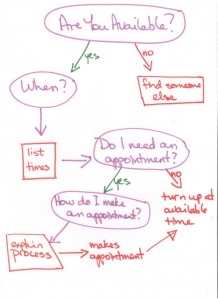When you say “no” to a request, do you offer an explanation?
Do you have your full schedule posted on your office door? Is your electronic Calendar publicly visible with all the details of your meetings?
Do you also find it hard to say no? Do you feel pressure to move meetings to accommodate other requests?
Over-explaining erodes your autonomy.
One of the attractions of an academic career is autonomy. This applies to the flexibility of your schedule as much as to the choice of research topic or freedom to teach a subject in the way you see fit.
By providing too much information about why you are (or are not) available, you are giving the person asking about your availability an opportunity to negotiate. You are effectively asking them “Is it okay with you that I’m giving this other activity priority over what you are asking me to do?”
Are you sure you want to do that?
I suspect that’s not what you thought you were doing. You probably thought that you were talking to someone who shares your values. That whoever is asking is obviously going to agree that whatever you are doing in that time they’d like to meet, is more important than they are. It can be a particularly nasty shock when they don’t agree and ask you to cancel or reschedule an activity to accommodate them.
Autonomy depends on mutual respect and trust. The fact is, it doesn’t matter if they agree with the priority you have given things. You don’t need external validation that you are prioritising things appropriately. And they have enough of their own problems to worry about.
You are not being “unavailable“. You are just not being available at someone else’s whim.
Too much information.
Most people only need to know one thing: Are you available?
You’ll note that the word “now” is not in that question. In this line of work there are very very few true emergencies.
Focus on what people need to know.
If you want to make information available without a direct request, you have a few options:
Put a sign on your door indicating when you are available to see students. Only the available times. Provide additional information about whether an appointment needs to be made in advance (how?) or whether it is first come first served.
If you make your electronic calendar publicly viewable, only show Free/Busy status. Then make sure to make appointments with yourself for grading, writing, and all the other work you do alone so your whole day doesn’t fill up with meetings with others.
Some calendars offer the option of putting “appointment availability” slots in your calendar.
There are also various paid services that will allow you to indicate availability for different activities and have students book appointments. I use Time Trade for appointment booking and my partner (a professor) has started using it for office hours and graduate supervision. I know other people use Calendly or something similar. If you are booking meetings with colleagues you can just use the meeting request system in the calendar you are both using.
The advantage of this system is that it frees up all the time you spend going back and forth agreeing a time.
The key to any of these systems is your own confidence that you are prioritizing your time appropriately.
I am aware that some people do have a right to know what you are doing with your working time. Your head of department, perhaps, or the dean. The fact that one or two people need more information is not a good reason to give that information to everyone. In particular, students only need to know when you are available for consultations with students. You need to be available for this activity a couple of hours per week. There will be local rules. How you spend the rest of your time is none of their business.
Related Posts:
Your colleagues aren’t any better at saying no than you are
Academic citizenship & getting better at saying no
This post was edited Nov 13, 2015. Edited and added to Saying No Spotlight, March 2022. Added to the Spotlight On: Confidence in March 2024.









Leave a Reply